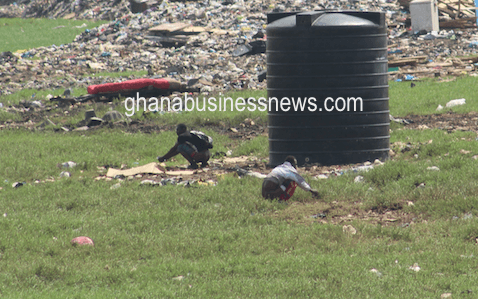Cholera’s grim resurgence in Ghana
The sudden dizziness, relentless diarrhoea and stomach cramps that feel like something writhing inside, coupled with the fear of dying from dehydration, is what Joshua Agbashie and other victims of cholera in Ada are grappling with as an almost forgotten disease resurfaces. The post Cholera’s grim resurgence in Ghana appeared first on Ghana Business News.


 The sudden dizziness, relentless diarrhoea and stomach cramps that feel like something writhing inside, coupled with the fear of dying from dehydration, is what Joshua Agbashie and other victims of cholera in Ada are grappling with as an almost forgotten disease resurfaces.
The sudden dizziness, relentless diarrhoea and stomach cramps that feel like something writhing inside, coupled with the fear of dying from dehydration, is what Joshua Agbashie and other victims of cholera in Ada are grappling with as an almost forgotten disease resurfaces.
Agbashie thought his symptoms would ease after being discharged from the hospital a few days after admission, but, barely at home, he was forced back to the health facility for a second, with a more extended admission as cholera continued to wrack his body.
Cholera statistics
Cholera is an acute diarrhoea disease caused by an infection with the bacterium Vibrio cholera, which can affect both children and adults. Cholera symptoms include diarrhoea, fatigue and weakness, nausea and vomiting, dehydration, and rapid heartbeat, among others.
A Ghana News Agency (GNA) report indicates that a total of 16 people have died and 115 others infected with cholera in various parts of four regions in the country within one month.
Disclosing this, Dr. Dennis Laryea, Head of Disease Surveillance at the Ghana Health Service, noted that 1,350 suspected cholera cases were reported in the Greater Accra, Eastern, Central, and Western Regions within the period.
He noted that cholera infections have been recorded in about 12 districts across these four regions, with a Case Fatality Rate of 1.2 percent, explaining that while most infections were not severe, fatalities occurred due to delays in reporting cases to health facilities.
Causes and spread
Agbashie suspects that their water source, a river, can be the source of his cholera, revealing that they bathe in the water and use some to wash dishes, with some cooking with it and drinking it.
The Greater Accra Regional Health Directorate Cholera outbreak-situational report Number 11, indicates that the main source of drinking water in the affected communities in the Ada East and Ada West districts includes uncovered wells, boreholes, and sachet water, coupled with poor sanitation with open defecation and indiscriminate waste disposal in the communities due to limited access to toilet facilities and waste disposal sites.
Dr Philip Narh, the Medical Superintendent of the Ada East District Hospital, revealed that houseflies are the primary carriers of cholera, transferring faecal matter from open defecation areas to food and water sources.
“This innocent ingestion of contaminated food leads to cholera infection. Moreover, a handshake can also be a means of spreading the disease if proper hygiene practices are not followed. So, cholera is simply the ingestion of someone’s faecal matter,” he stressed.
According to him, the pollution of water bodies in the district is another significant concern, with open defecation giving a worrying trend as rainwater carries faecal matter into water sources, contaminating them and putting users at risk.
“When people openly defecate and it rains, the water carries the faeces into the water bodies, contaminating them for users,” he said.
Prevention strategies
For cholera to be controlled, a strong focus on prevention and collaboration is essential. Stakeholders, including local government authorities, non-governmental organisations and public health officials need to prioritise and intensify public education on handwashing, safe drinking water, and food hygiene.
Community-based campaigns that use local languages and relatable scenarios can help residents recognise risky practices and adopt safer alternatives.
The District Assembly authorities should also prioritise enhancing infrastructure by improving water access and waste disposal systems; this requires collaborative efforts across multiple sectors.
Local governments should focus on strengthening sanitation policies, conducting regular health inspections, and implementing strict regulations against open defecation, a practice still observed in many rural parts of Greater Accra.
The local government authorities can also ensure the enforcement of strict sanitation standards, ensuring waste is properly managed, and providing safe waste disposal systems. With cholera primarily transmitted through contaminated water and food, better regulation of local food vendors can also help contain the spread.
Healthcare facilities in Ada East, Ada West, and Kpone-Katamanso must also be equipped with adequate resources to handle the influx of cholera patients, including lifesaving rehydration salts and intravenous fluids.
In addition, schools in these areas can play a vital role by teaching pupils and students essential hygiene practices that they can share with their families. Collaborations with religious and community leaders and the use of the National Commission on Civic Education (NCCE), assembly members, and unit committee members could also amplify the reach of cholera prevention messages, ensuring that even the most remote households receive life-saving information.
Applying COVID-19 lessons to cholera
The COVID-19 protocols taught Ghana and the world how quickly to mobilise against infectious diseases; that same urgency can be used to address the resurgence of cholera outbreak as the pandemic brought profound changes in hygiene practices across Ghana. Regular hand-washing stations appeared in public spaces, community awareness programmes educated residents on sanitation, and people became more mindful of hygiene in public areas. These practices, if continued and modified, could significantly reduce the spread of cholera.
During COVID-19, many communities installed hand-washing stations and promoted proper hand hygiene. These stations, if reintroduced in cholera-prone areas, can drastically reduce cholera transmission, as statistics from the GHS showed that cholera reduced drastically during the COVID-19 era.
The success of COVID-19 protocols relied heavily on public health education, with messaging reaching even the most remote communities. Health authorities and community leaders can leverage a similar approach to inform residents about cholera’s symptoms, transmission, and prevention.
Leveraging sanitation policies
Ghana has many policies on Water Sanitation and Hygiene (WASH), which, when implemented well, have all the solutions to mitigate cholera and other water and sanitation-based diseases.
The policies include National Water Policy, Liquid Waste Management, Ghana WASH Sector Development Programme (2021-2030), National Solid Waste Management Strategy, Rural Sanitation Model and Strategy, and the Greater Accra Metropolitan Area Sanitation Masterplan, among others.
The National Water Policy seeks to ensure sustainable access to safe and clean water, focusing on the rights of citizens to water and the need for efficient management. By ensuring clean water access, the policy targets one of cholera’s primary vectors, as contaminated water is the primary cause of transmission.
The Ghana WASH Sector Development Programme (2021-2030) to provide universal access to water and sanitation by 2030 with a focus on improving water quality, ensuring safe sanitation, and promoting hygiene practices. These aspects are essential for cholera control, as access to clean water and safe sanitation directly reduces the spread of water-borne diseases.
The National Solid Waste Management Strategy focuses on reducing waste accumulation, improving waste collection, and enhancing waste disposal facilities. Proper waste management is crucial to preventing the breeding of disease-causing pathogens, which can contaminate water sources and lead to outbreaks.
Implementation of the Rural Sanitation Model and Strategy aims to improve sanitation access in rural areas through education, building toilets, and promoting hygiene practices.
Cholera can be significantly curtailed in the many rural communities in the affected districts if these goals are met, as they reduce open defecation and encourage practices that minimise disease spread.
Despite the good aims and objectives of these policies on water, waste management, sanitation, and hygiene, poor implementations, especially in the peri-urban and rural areas, are manifested in the resurgence of cholera in Ghana.
Conclusion
In Ghana’s renewed battle against cholera, urgent action is essential. The alarming rise in cases across vulnerable communities like Ada East, Ada West, Kpone-Katamanso and Kasoa highlights the ongoing sanitation, water quality, and waste management challenges that perpetuate this preventable disease.
To curb cholera’s deadly toll, it’s crucial to leverage existing WASH (Water, Sanitation, and Hygiene) policies, amplify public health education, and prioritise clean water and sanitation infrastructure.
Government agencies, NGOs, and community stakeholders must collectively champion proper waste disposal, safe water access, and rigorous hygiene practices, which are fundamental steps to prevent future outbreaks.
Learning from Ghana’s COVID-19 response, public health efforts can target remote communities, fostering resilience through consistent health education, improved sanitation, and an unwavering commitment to safety. It’s time for decisive action to ensure that the preventable tragedy of cholera is finally relegated to the past.
By Laudia Sawer
Source: GNA
The post Cholera’s grim resurgence in Ghana appeared first on Ghana Business News.






















































